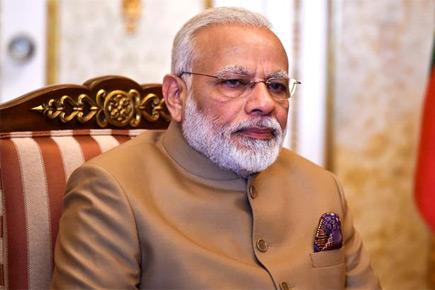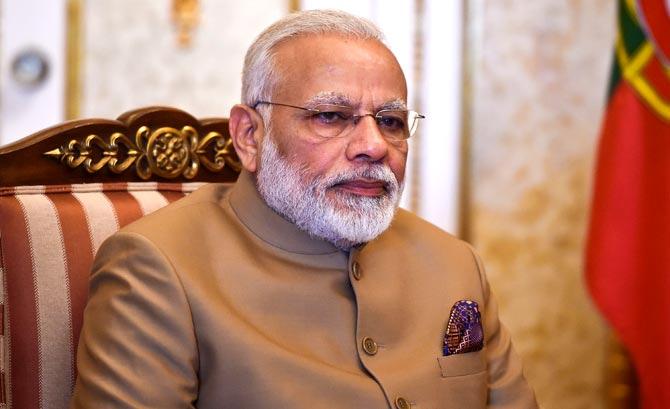Prime Minister Narendra Modi on Monday said that those who keep the country clean have the first right to chant Vande Mataram and wondered whether people who littered and dirtied the country had any right to the nationalist slogan


Narendra Modi. File pic
ADVERTISEMENT
Prime Minister Narendra Modi today said that those who keep the country clean have the first right to chant Vande Mataram and wondered whether people who littered and dirtied the country had any right to the nationalist slogan.
Modi was addressing a students' convention at Vigyan Bhawan to mark the 125 years of Swami Vivekananda's address at the World Parliament of Religions in Chicago and the centenary celebrations of Pandit Deendayal Upadhyay.
"As I entered, I heard people loudly chanting Vande Mataram...The value of patriotism fills my heart. I am asking all countrymen whether we have the right to chant Vande Mataram. I know this will hurt many people.
"We chew 'paan' and spit it out on Mother India (Bharat maa par pichakaari mare) and then chant Vande Mataram. Throw garbage and then chant Vande Mataram... The sanitation and cleaning workers have the first right to say Vande Mataram," he said.
Modi was welcomed at Vigyan Bhawan with shouts of 'Vande Mataram' and 'Bharat Mata ki Jai'. The slogans could also be frequently heard during his speech, which lasted for almost an hour.
Urging people to keep their surroundings clean, the prime minister told the gathering that people may or may not keep their surroundings clean but nobody had the right to dirty places.
The comments come in the backdrop of the government's efforts to 'clean India' by October 2, 2019, the 150th birth anniversary of Mahatma Gandhi.
Modi also batted for innovation and promoting skills among the youth and asked them to work for a modern India. The world evaluates the country where it is today not what it was 5,000 years ago or during the times of Lord Rama or Buddha, the prime minister said.
Vivekananda supported experimentation and innovation and his government was working according to the ideals shown by him, Modi said. Emphasising that Vivekananda's historic September 11 address in the US was a message of love and brotherhood, the prime minister said the devastating 9/11 terror strike might not have happened if the significance of his speech had not been forgotten.
The prime minister also asked colleges to hold cultural events to celebrate other states and added in a light-hearted vein that he was not against celebrating days like 'rose day'. Students should do more, Modi said, asking them to hold a Tamil day in a Haryana college or a Kerala day in a Punjab college to strengthen the spirit of 'Ek Bharat, Shreshtha Bharat (One India, Great India)'.
"There is no better place for creativity and innovation than university campuses...There is no life without creativity. Let our creativity also strengthen our nation and fulfil the aspirations of our people," he said. He said many promises were made during university election campaigns but nobody pledged to keep campuses clean.
Modi also said that only those who respect women can take legitimate pride in the opening words of Swami Vivekanand's address, "Brothers and sisters of America".
Referring to the correspondence between Vivekananda and Jamsetji Tata -- asking the industrialist to set up industry in India -- he said it shows the spiritual leader's concerns on India's self-reliance.
Stressing the importance of the Skill India mission, the prime minister said his government had created a separate ministry for the purpose and added that youth should be groomed in a way that they don't depend on anyone for employment.
"They should be not be job seekers but job creators," he said, referring to various programmes of government like Start Up India, Stand Up India and the Mudra scheme.
Vivekananda, the prime minister said, gave the concept of 'One Asia'. He quoted him as saying that 'One Asia' would have the "strength to show the way" when the world was surrounded by problems.
Modi said India's standing in the world had risen, and credited 'janshakti' (people's power) for this.
"When I go to different countries, I feel that there is change in the way it perceives India (dekhnay kaa najariya badal chukka hai). This is not the political strength but people's power (janshakti)," he said.
 Subscribe today by clicking the link and stay updated with the latest news!" Click here!
Subscribe today by clicking the link and stay updated with the latest news!" Click here!






